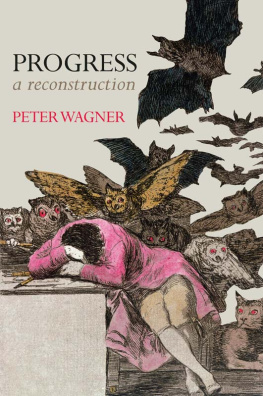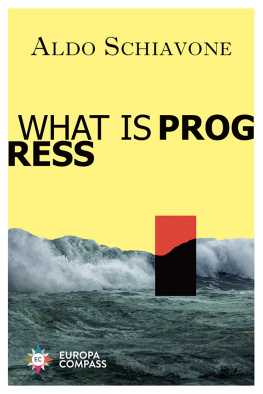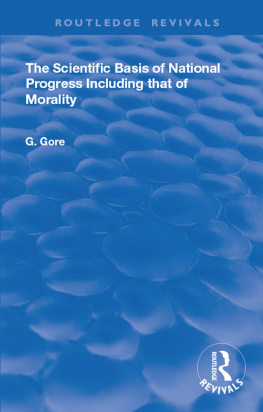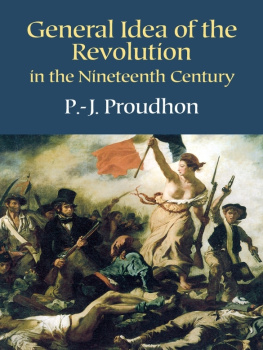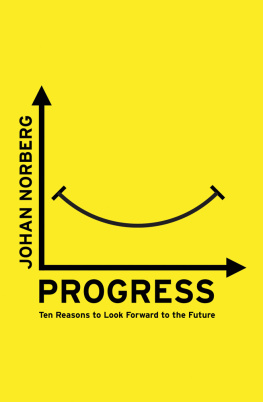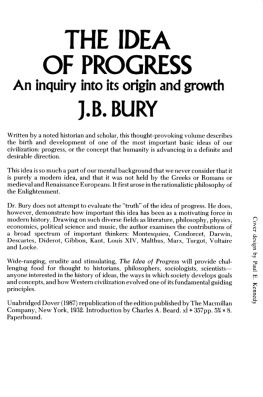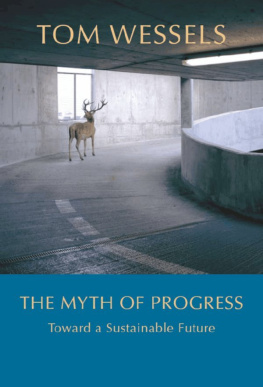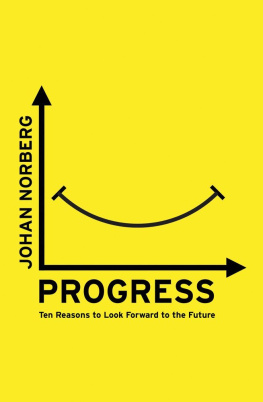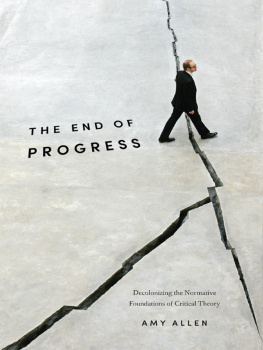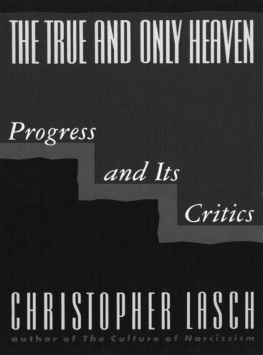Table of Contents
List of Illustrations
Guide
Pages
For Nathalie
Copyright page
Copyright Peter Wagner 2016
The right of Peter Wagner to be identified as Author of this Work has been asserted in accordance with the UK Copyright, Designs and Patents Act 1988.
First published in 2016 by Polity Press
Polity Press
65 Bridge Street
Cambridge CB2 1UR, UK
Polity Press
350 Main Street
Malden, MA 02148, USA
All rights reserved. Except for the quotation of short passages for the purpose of criticism and review, no part of this publication may be reproduced, stored in a retrieval system, or transmitted, in any form or by any means, electronic, mechanical, photocopying, recording or otherwise, without the prior permission of the publisher.
ISBN-13: 978-0-7456-9099-5
ISBN-13: 978-0-7456-9100-8(pb)
A catalogue record for this book is available from the British Library.
Library of Congress Cataloging-in-Publication Data
Wagner, Peter, 1956 September 18
Progress: a reconstruction / Peter Wagner.
pages cm
Includes bibliographical references and index.
ISBN 978-0-7456-9099-5 (hardback: alk. paper) ISBN 978-0-7456-9100-8 (pbk.: alk. paper) 1. Progress. 2. Social change. I. Title.
HM891.W34 2015
303.4dc23
2015017032
Typeset in 11 on 14 pt Sabon
by Toppan Best-set Premedia Limited
Printed and bound in the UK by CPI Group (UK) Ltd, Croydon, CRO 4YY
The publisher has used its best endeavours to ensure that the URLs for external websites referred to in this book are correct and active at the time of going to press. However, the publisher has no responsibility for the websites and can make no guarantee that a site will remain live or that the content is or will remain appropriate.
Every effort has been made to trace all copyright holders, but if any have been inadvertently overlooked the publisher will be pleased to include any necessary credits in any subsequent reprint or edition.
For further information on Polity, visit our website:
politybooks.com
Foreword
In 1799, a decade after the French Revolution and the death of the enlightened monarch Carlos III, Francisco de Goya etched El sueo de la razon produce monstruos, reproduced on the cover of this book, as a part of his series Los caprichos. The etching can be interpreted as a commitment to the Enlightenment belief in reason: when reason sleeps, monsters will take over. But it can also be read more ambivalently: it is the dream of reason to create monsters that will rule the world.
One of the dreams of Enlightenment reason was that humankind would embark on a path of perpetual progress. More than two centuries later, we are not sure what to make of this dream. If we look at the current world, can we see it as the dream come true? A world of material abundance, of widespread commitment to freedom and human rights, and in a global process of democratization? Or did reason fall into deep slumber, dreamless or nightmarish, leaving us with poverty and violence and adding the destruction of the planet to the older evils of humankind?
Not sure what to make of the dream, we have tended to forget about it. The idea of progress is out of joint with the current time. Maybe not any idea of progress, but the grand idea of historical progress, of general progress of humankind. And maybe this is as it should be. Maybe the grand idea of progress was a dreamlike projection onto future history of unrealizable wishes and desires, and by now we know that this was nothing more than a dream.
Even if this were so, this book suggests that it is worth the effort to retrieve the idea of progress, review it and see whether one can reconstruct it on new terms, appropriate for our time. The expectations of progress may have been exaggerated, but they provided human beings with an orientation in space and time. Progress had a place: it originated in Western Europe with the scientific revolution, the French Revolution, and the Industrial Revolution. And it opened up a new time, a future history with an open horizon, during which progress would spread across the whole planet. This is how West Europeans used to see world history, and this view gave them confidence about what to do and to expect.
As we shall see, this belief was often shaken, not least during the first half of the twentieth century, but it proved unwilling to die. Even in recent times, though more rarely, both public debate and academic research could refer to some countries and their people as advanced industrial societies or advanced democracies, whereas other societies still had to develop, to catch up, or more recently, to emerge. Even though philosophy of history had long been discredited as a genre, some sense still prevailed that there is a direction in which human history moves. And the predominant view was that this direction was a good one, that there had been progress and will be more progress, opposed only by those who were not ready for the new times. The starting observation of this essay is that we are losing this sense entirely not today or yesterday, not suddenly, but gradually, starting in the past half century and more radically since the late 1970s.
This loss should be welcomed for many reasons. This view created a spatio-temporal hierarchy that denied human beings in many parts of the globe coevalness with the people of the North, to paraphrase Johannes Fabian. It justified domination over human beings against their will but for the supposed benefit of humankind in the name of progress. Today, in contrast, it often seems that the farewell to a misplaced overconfidence in the spatio-temporal ordering of the globe has been replaced by generalized disorientation. And this is neither necessary nor desirable.
Is there a place between the overconfidence of the past and the disorientation of the present? If we abandon the dream of perpetual progress, is there a way of going on that still means going forward? Are there ways to reconsider the doubts about progress without leaving us with nothing but doubts?
These questions are interesting, some readers may now say, but can we really answer them? After all, there were good reasons why philosophy of history was abandoned. And that kind of historical sociology that sweepingly talked about long-lasting trends and great ruptures, which emerged during the nineteenth century in the wake of philosophy of history, was exposed to similar criticism with the professionalization and the specialization of the social sciences during the twentieth century. Maybe we should be content with the kind of knowledge that solid empirical research can provide and stop asking questions that we cannot answer.
This essay proceeds on the assumption that we should at least try. The questions are too important to be left without answers or, maybe worse, to be left with the numerous inadequate answers that are currently given. The questions that were posed by the best of historical sociology remain alive and urgent, but they need to be addressed by new means. (The bibliographical note at the end of this book hints at what those means are and where they can be found. Readers with methodological interest may want to read this note first.)
But what exactly can we expect from this attempt? The answer is simple: to avoid having to accept the present time as it is. Our present time is the realization of some of many possibilities created in the past. An exploration of our place in time helps us to understand the range of past possibilities and the reasons why many of them were discarded and few of them realized. Situating the present in time, thus, is a way of comparing the real with the possible. From this angle, the possible always has two forms: the past possible and the present possible. Historical sociology helps us to understand the possibilities of the past, the struggle over which has created the present. To analyse these struggles from the angle of the claims for the future that were then made, in turn, helps us to see the present as providing a range of possibilities for our future. In this sense, there is a direction of history that no quarrel over method or dissection of concepts will make disappear. But we cannot advance in this direction on a road already laid out; we need to go ahead by building the road where we want it to lead. The purpose of this essay is to explore past possibilities with a view to better understanding present possibilities. If it succeeds, some sense of orientation will be restored, hopefully an adequate sense.

